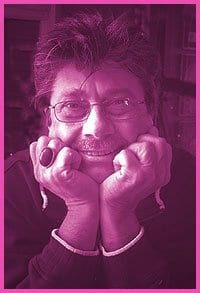We are inundated with stories about music downloading being a disaster for record companies and music in general as the major labels have been cutting back on their new releases. What is sorely missing from this debate is the current situation of radio. Over the last 15 years our governments have refused to stop media concentration. With the exception of FLOW 93.5FM, every commercial radio station in Toronto is owned by three or four major conglomerates, which also own dozens of others across Canada and most of the television stations as well.
In the US it’s even worse as one company called Clear Channel owns close to 2,000 radio stations, with a near monopoly on concert promotions and 70 percent of ticket sales. Its operations are now in 65 countries including Canada. Clear Channel also produces some of the most rightwing and homophobic radio shows such as Dr Laura Schlessinger and Rush Limbaugh (and lead the recent anti-Dixie Chicks boycott). “Payola” is bigger than ever as record companies pay radio stations to add their music. Play lists have shrunk and become centralized at head office and the market has fragmented into more than a dozen major music formats.
The result is that radio has never sounded so boring and so corporate. People are tuning out and creating their own play lists by downloading the music they want to hear, when they want to hear it. The corporations have forgotten that a radio licence is a privilege, not a right.
Recently, an Oshawa radio station, CKGE newly dubbed The Rock and heard in Toronto at 94.9FM, gave a radio jockey by the name of David Marsden carte blanche to play what he wants every Thursday and Friday from 7pm to midnight. This is unheard of in mainstream radio and probably only happened because this station is independently owned. This jockey also just happens to be gay and did a Pride Day show of music all about being gay which ended with a Jimi Hendrix version of “Somewhere Over The Rainbow.”
On a typical Marsden show you may hear Carole Pope mixed into Janis Joplin then a bit of Smiths, The Doobie Brothers, The Spoons, some new garage band and then 10 minutes of often hilarious chat. You’re so entranced and excited at what you’re hearing that, before you know it, you’ve just spent three hours listening to a radio show that you want to tell all your friends about.
Marsden, aka The Mars Bar, is an absolute legend and pioneer in the radio business. His accomplishments are outstanding and include being the inspiration for a chapter in the media bible by Marshall McLuhan, Understanding Media. He has been inducted into the radio wing of the Rock And Roll Hall Of Fame in Cleveland (not once, but twice). He created Canada’s most popular Internet radio portal called Iceberg.com. He produced an award-winning ahead-of-its-time TV series for CBC/BBC called Pilot One back in the late 1980s that was the first to put Sex With Sue Johansen on TV. He just had a show of erotic photography on Church St.
But his biggest achievement is developing and directing CFNY FM during its heyday in the 1980s. Toronto’s CFNY, then known as “The Spirit Of Radio,” together with LA’s KROQ, were considered the two most influential radio stations in all of North America. Before the “no play list” CFNY was bought out by a bigger conglomerate (it’s now owned by Corus Entertainment), it broke countless gay acts and helped define the “alternative” sound before alternative became just another corporate musical genre. Besides acting as music director, Marsden was one of ‘NY’s most popular radio personalities, as he had been in the 1970’s at CHUM FM and at a station in Montreal. When the owners changed format back in ’87 to eventually become a new rock station as it is today, there was actually a mass protest and the CRTC held a public hearing.
“When I was at ‘NY,” says Marsden, “I use to call all the other stations McRadio, where you go and you have no choice. They are going to feed you your damn hamburger and you’re going to have 15 minutes to eat it and then you’re gone. No one could fondly remember any meal they’ve had at McDonalds. The listener listening to McRadio doesn’t have any memories of it, doesn’t have any fondness for it and doesn’t stay for more than 15 minutes.”
This radio pioneer also has lots to say on what’s happening – or not – in the gay scene. “Gays created everything creative. We were always there on the forefront of music scenes such as the early ’70s glam rock, disco, new wave, house and rave scenes. But now gays want to become more straight and we’re no longer in the forefront of anything.
“I find it really sad that young gay men now all want to look and act straight and are afraid to act different or take risks,” says Marsden, concluding with a question that sounds more like a lament. “Will we help create the next big thing in music?” Tune in to 94.9FM to find out.
* There will be a The Spirit Of Radio Reunion Party on Wed, Nov 12; more details to come.
DAVID MARSDEN.
7pm-midnight. Thu & Fri.
CKGE 94.9FM.

 Why you can trust Xtra
Why you can trust Xtra


